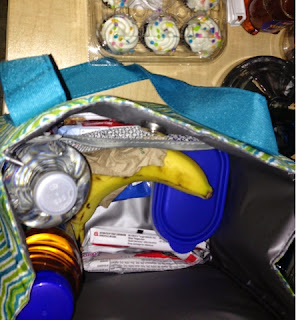For many, clinicals start bright and early, and that means waking up even earlier to get there and be ready. If you're anything like me, you like to sleep for as long as possible.
Here are some tips for getting ready for and being prepared for clinicals:
1) Check the weather
If it is supposed to be cold in the morning or all day, you don't want to leave your room without having a scarf or gloves. On the other hand, if it is supposed to be warm, you don't want to leave the next day with a sweatshirt or jacket on, because you'll just have to carry it.
2) Set out all of your clothes the night before.
You've probably been told this many times in high school and everything else. "Set out your clothes to be more prepared!" But this will help you out immensely. Have your scrubs folded and sitting on the dresser/chair/whatever so it's not on the floor, along socks inside your shoes, and a warm up jacket (if you have one) or long sleeved shirt for underneath your scrubs.
3) Put your name tag somewhere you would remember.
Put your name either on your scrub top so you don't have to do it in the morning, or in your scrubs pocket or a bag of yours so you know it's there and won't lose it. Keep it consistent. When you're done with clinicals for the day, put it back in that same spot.
4) Check your wallet.
Whether you have to take a bus, train, or you're carpooling, you're going to have to pay someone for transportation. Make sure you have enough money to pay for the bus/train fare or pay someone for gas. If you're driving alone, make sure you have enough money to pay for parking - some clinical sites make you pay for parking. You don't want to be blindsided because you don't have enough money. Also, if you plan on buying food there (if you are there for any meals or just want a snack) make sure you have enough money on hand for that. A lot of vending machines now have credit card readers so all you have to do is swipe your card and you'll get what you want. BEWARE! This is a great way to go through your money quickly. My recommendation - only pay for things in the vending machine with cash! You'll be less likely to spend as much
5) Pack your lunch.
 |
| granola bars, banana, apple juice, pretzels, and a sandwich in the fridge |
If you're at your clinical site for any meal and don't plan on buying your meal at the cafeteria (also, not all clinical sites have a cafeteria for you to buy food at), you should probably pack your lunch.
If you don't eat breakfast right after waking up, pack breakfast bars or other things in your lunch bag so you can eat at sometime before clinicals.
Remember to include: main meal (sandwich, pasta, salad, pizza, soup), snacks (pretzels, chips, fruit snacks, breakfast bars), fruit (banana, cut apples, grapes), and a drink (water with a drink mix, bottle of apple/orange juice, soda). Put another bottle of water in your bag, because you drink much more water during the day than you think you do.
6) Pack your clinical bag.
You probably have certain things that you have to bring to clinicals, including but not limited to: stethoscope, blood pressure cuff, pen, pencil, black sharpie, penlight, and iPad/notebook. You know what your instructors want you to bring.
7) Set up your desk/vanity/bedside table for the morning.
Do you take any medications in the morning? Put them out so you don't have to go far to take them. Put a bottle of water there too. If you need to put your hair up, include a comb/brush with a hair-tie, bobby pins, clips, or headbands - whatever you need to put your hair up.
8) Shower
This could be done before you go to bed or before you go to clinicals - whichever makes you happy. But please do it. And that includes all other personal hygiene habits, like deodorant and brushing your teeth. Just please do it. Everyone around you will be thankful.
9) Check your alarms
You don't want to sleep in and miss your clinicals. Just make sure you are ready to wake up on time.
10) Put your lunch bag (unless there is stuff in the fridge still), clinical bag, and clothes all together in one condensed area.
By keeping everything in the same area, you don't have to travel all over your room or house to get to your stuff. It's all right there. If you have food that should be refrigerated until you can put it in your bag and go, keep your lunch bag by the fridge. It'll help remind you that there is food in there for you.
11) Try to go to sleep early.
know I included a lot of steps in here and it makes it seem like if you do them all, you'll be up all night getting ready for clinicals. But once you get in the habit, making your lunch and packing your clinical bag will be so incredibly easy.
12) Wake up and start getting ready.
Get dressed, brush teeth, brush hair and put it up. Eat breakfast (if you want to) and grab your bags and leave. Your morning routine will take you no more than 20 minutes if you don't shower, 30-35 if you do. That way you can get the most sleep possible without running around like a chicken with its head cut off.
Is there anything that you do in the morning or the night before that helps your morning go faster?






























